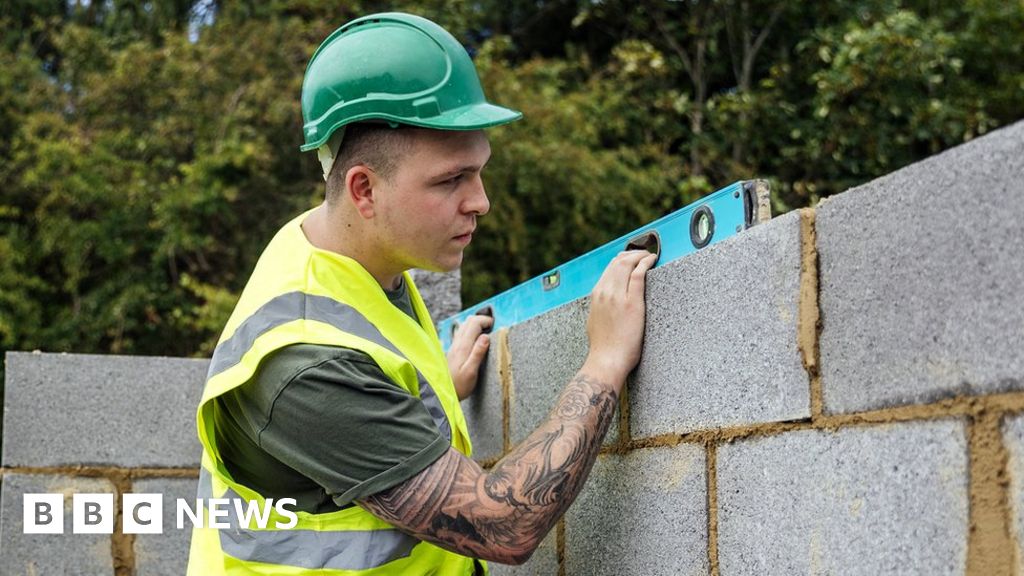Number Of Firms In Critical Financial Distress Rises Sharply

Image source, Getty Images
A growing number of UK businesses are at risk of going under, as costs spiral and Covid loan repayments come due, a report has found.
Construction and hospitality are the sectors struggling most, according to insolvency firm Begbies Traynor.
Loan repayment schedules should be extended to ease the pressure, it said.
The government said it had given businesses an "unprecedented package of support" and increased flexibility in paying back Covid loans.
In the first three months of this year there was a 19% rise in businesses in critical financial distress compared to the start of 2021, the report by Begbies Traynor said.
Julie Palmer, a partner at the insolvency and restructuring specialist firm, said without further action to help struggling businesses there would be a wave of business failures.
"It's just a case of when the dam holding it back finally bursts," she said.
Begbies Traynor, which publishes regular health checks on the state of British businesses, said its "Red Flag Alert" research reflected the strain two years of extraordinary financial pressures have had on thousands of companies. It said 1,891 firms now fell into the category of critical, suggesting their outlook is precarious.
Although Covid restrictions have been lifted, some firms are still feeling the impact of disruptions to supply chains and the price of energy and other inputs have risen sharply.
Firms are finding it hard to recruit staff in some sectors, and wage costs, including the minimum wage and National Insurance payments, have gone up.
With the cost of living rising, many UK households are looking for ways to save money, putting further pressure on businesses that rely on discretionary spending, like bars and restaurants.
"Inflation... gets referred to as the silent thief of the economy, I think it's actually becoming a bit of an armed robber, with real inflation probably running much higher than the [official figure] of 7%," Ms Palmer said.
There is also a "post-Brexit hangover" and these factors combined are "a perfect storm" of pressures on businesses, she said.
Begbies Traynor's research highlights a sharp rise in County Court Judgements (CCJs), an early sign of future insolvencies, because they show creditors are making legal claims.
CCJs were up 157% compared to a year ago, the report said.
Courts were effectively closed for business for creditors to take action during the pandemic, Ms Palmer said, and the logjam of court cases due to Covid meant the current level of CCJs was likely to be the tip of the iceberg.
She added that from Saturday landlords will be able to start making legal claims against businesses.
"We think the landlords, who are a very impatient lobby, will swell those figures," she said.
Image source, Getty Images
Government insolvency figures for March also illustrate the trend towards more insolvencies. They show creditors voluntary liquidations, the most common way for firms to be wound up, had more than doubled compared to a year earlier.
During the acute phase of the pandemic many firms relied on state support. But that support was now gone while firms were now facing a perfect storm of rising wage, energy and borrowing costs, Begbies Traynor said.
Ms Palmer said the government faced a choice: "Do they rush to recover funds handed out during the pandemic to ensure there was a functioning economy afterwards? Or [do they] look for ways to control the number of businesses that fail?
"Having put so much money into protecting businesses over the past two years, ministers won't want to see it wasted as companies collapse, unable to repay their debts," she said.
She said leniency, or taking a longer-term view of repayments of the Coronavirus Business Interruption Loan Scheme, would help embattled businesses.
A government spokesperson said support offered to businesses during the pandemic included VAT cuts, business rates holidays and government-backed loans worth around £400bn.
"We have given businesses increased flexibility in repaying their Covid-19 loans, with borrowers under the Bounce Back Loan scheme able to extend their repayment term by ten years, as well as apply for repayment holidays," the spokesperson added.
From Chip War To Cloud War: The Next Frontier In Global Tech Competition
The global chip war, characterized by intense competition among nations and corporations for supremacy in semiconductor ... Read more
The High Stakes Of Tech Regulation: Security Risks And Market Dynamics
The influence of tech giants in the global economy continues to grow, raising crucial questions about how to balance sec... Read more
The Tyranny Of Instagram Interiors: Why It's Time To Break Free From Algorithm-Driven Aesthetics
Instagram has become a dominant force in shaping interior design trends, offering a seemingly endless stream of inspirat... Read more
The Data Crunch In AI: Strategies For Sustainability
Exploring solutions to the imminent exhaustion of internet data for AI training.As the artificial intelligence (AI) indu... Read more
Google Abandons Four-Year Effort To Remove Cookies From Chrome Browser
After four years of dedicated effort, Google has decided to abandon its plan to remove third-party cookies from its Chro... Read more
LinkedIn Embraces AI And Gamification To Drive User Engagement And Revenue
In an effort to tackle slowing revenue growth and enhance user engagement, LinkedIn is turning to artificial intelligenc... Read more

